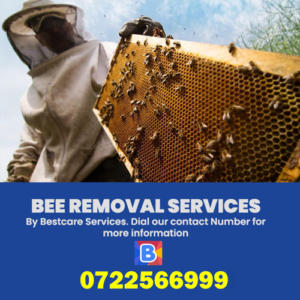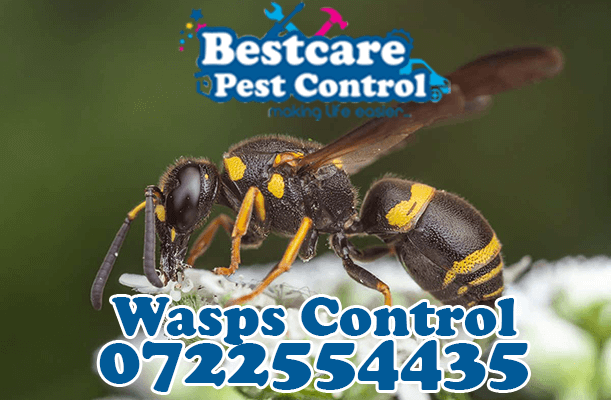Wasp Control & Removal Services, Bee Removal and Pest control in Nairobi and Kenya
Contact Bestcare Services on 0722566999 for the best wasp removal and control, bee removal and pest control services in Nairobi and the rest of Kenya. Any swarm of wasps should be removed as quickly as possible as they can establish new nests or hives very rapidly and in large numbers.
Although wasps are considered beneficial insects, they become a danger to the health of humans and pets as a stinging pest, when they build nests or hives within, on or adjacent to areas where we live. Bestcare pest control specialists are experts in bee control solutions that are safe for your family and home. Professional wasp removal by Bestcare is your best choice to get rid of wasps around your home, garden or business.
Most importantly, we know wasps in your area. We have pest technicians on the ground in the following key locations and other surrounding regions:
If you have honeybees in your house, businesses, schools or any building, please call Bestcare Services to discKenya your options.
If you find a cluster of bees on your property, don’t panic. Don’t grab a can of Bee and Wasp Control and spray them. And don’t call an exterminator. For proper removal and avoiding the risk of stings, call Bestcare Services.
Call us today and speak to one of our bee specialists about removing the bees from your home or property.
We service residential and commercial customers throughout Nairobi & Kenya as a whole.
Bee removal can be a dangerous and difficult experience. Keep in mind that even if you only see a few bees around the area, there could still be a nest or hive of them nearby of which you are not aware. That’s one of the reasons why it is always a good idea to get professional services from Bestcare Services bee pest control expert for help with bee removal.
Read about our Humane Bee Removal and Relocation Services in Nairobi, Kenya
TYPES OF WASPS WE CONTROL & REMOVE
Wasps are a diverse group with over one hundred thousand described species around the world.
In Kenya, there are many wasp species that are a problem. The native paper wasp and the imported European wasp among others. Most of the wasps in Kenyan backyards are native wasps.
Female wasps emerge from hibernation each spring and immediately start building nests. The wasp that starts a nest becomes the queen and so earns the right to be the only individual to lay eggs in that nest.
Unlike bees, the wasp’s sting doesn’t rip out of its body when it stings you, so a wasp is capable of stinging multiple times.
Did You Know?
- Wasps recognise and remember each other’s faces
- Social wasps live in nests inhabited by 5,000-10,000 wasps at one time
- Wasps sleep and even hibernate for months while hanging by their teeth
- When a wasp dies it emits a pheromone in the air which acts as a warning signal to other wasps
Wasp control Services in Nairobi, Kiambu, Thika, Eldoret, Nakuru, Mombasa, Limuru, Machakos and the rest of Kenya
Are you experiencing a wasp infestation on your property? Bestcare Pest Control state-licensed pest specialists are trained in the most effective wasp control and removal methods in the industry. We will deliver safe wasp removal treatments so you do not have to worry about being stung from doing it yoKenyaelf.
Identifying wasps is difficult without professional training. Accurate identification is very important as it will help determine the best treatment. Wasps can be easily mistaken for other stinging insects such as bees.
If you have spotted what you believe may be a wasp nest on your property, do not approach the nest yoKenyaelf as wasps are dangerous. Contact your local pest control experts at Bestcare Pest Control at 866-843-0548 or schedule a free pest inspection online.
Wasp control treatments
Bestcare Pest Control strongly advises against attempting to remove wasp nests by DIY methods as this can be highly dangerous. Our specialists have the appropriate equipment and wear protective gear to remove wasp nests safely.
Identification – Correctly identifying the type of wasp that is infesting your property is key to successfully removing them.
Recommendation – Once the wasp is identified, your specialist will make a treatment recommendation. The method of removal your specialist will suggest will depend on a variety of factors including the type of wasp, the location of the nest, state and local regulations and the severity of the infestation. Once a treatment plan is agreed upon, your specialist will provide you with a quote for services.
Treatment – The method of treatment used will vary depending on the type of species.
Paper wasp nest will be treated directly with an aerosol insecticide, repellent liquid residual, or residual dust. Once the colony is eliminated, your specialist will remove the nest.
Yellowjacket nests are controlled by applying a residual dust into the opening of the nest. If there isn’t a nest to treat, yellowjacket traps will be placed where the insects commonly gather.
Bald-faced hornet nests will be treated by applying a residual dust into the entrance of the hole of the nest. Then, your specialist will puncture the side of the nest and apply additional dust into the nest.
Wasp control cost
The cost of wasp control will vary based on many different factors, which is why an inspection prior to quoting will provide the most accurate cost. Our wasp control specialist will take into account some of the following factors:
- Size/number of nests
- Height of nest
- Accessibility of nest
Wasp deterrent tips
You can actively and regularly check your property for signs of nests to enable early treatment. You can also make changes to your behavior and how you handle food and drink outdoors to help deter wasps.
- Check for nests – Check your home and garden in early spring for nests. Early on, the nests will be walnut or golf ball in size. Early small nests have fewer wasps and are easier to treat quickly. Look for nests in lofts, garages, sheds, cavity walls or under eaves.
- Secure garbage – Ensure oKenyaide garbage cans have tightly fitting lids. Keep your garbage at a distance from doors and windows.
- Keep windows and doors shut – This will help to prevent wasps from entering inside your home.
Although high numbers of wasps in your home or garden almost certainly means there is a nest nearby, getting rid of a nest may not always be a possible solution. If the nest is not on your property, you will have very limited control over what you can do to remove it. Nests located in confined, hard-to-reach areas (such as cavity walls) will also be more difficult to treat. It’s best to contact us for removal services!
Need a professional solution for your wasp or hornet nest?
Over the years, Bestcare Pest Control has developed expertise in handling wasp species in the eastern Kenya. We understand the appropriate way to treat for wasps, and our well-trained specialists seek to provide the optimal wasp control service that suits your specific situation.
For peace of mind, and to be completely safe from stings, it is safer to let a professional Bestcare Pest Control specialist treat the nest for you.
Other Services We offer include :

AMAZINGLY EFFECTIVE BEE REMOVAL SERVICES !
We move and remove bees safely, to ensure that your living space is safe, and the bees find a new home

BEES ARE VERY IMPORTANT AND USEFUL
Bees are incredibly useful to both the environment and human beings. They are one of the most important pollinators in the world, and play a vital role in the reproduction of many plant species. Without bees, many crops would fail, resulting in a significant reduction in food production.
In addition to pollination, bees are also responsible for producing honey, beeswax, and other products that are used in a variety of industries. Honey, for example, is not only a delicious food, but also has many medicinal properties and is used in skincare products.
Bees also play an important role in maintaining the biodiversity of ecosystems, and their presence can be an indicator of the health of an environment.
However, bee populations around the world have been declining due to a variety of factors, including habitat loss, pesticide use, and disease. It is important to protect and support bee populations in order to maintain their important contributions to the environment and our society.

